The New York Times reports that during an interview Friday, President Barack Obama indicated he is considering negotiations with some elements of the Taliban. Outwardly, the concept of America negotiating with barbarians seems absurd. Remember the brutal atrocities committed by the Taliban in Afghanistan under Mullah Mohammad Omar?
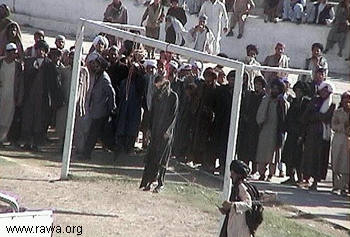
Kabul: Public executions under the Taliban rule on September 23, 2000 (taken by a RAWA hidden camera)
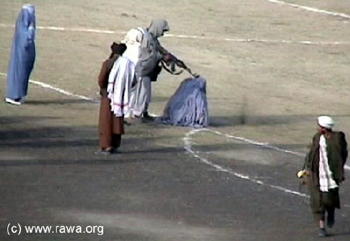
Perhaps the insurgents collectively known as ‘Taliban’ in Afghanistan and Pakistan need closer examination. Perhaps these are not the same Taliban as the ones Mohammad Omar once ruled (he reportedly resides just across the border in Quetta, Pakistan).
The Times reported Sunday, “Asked if the United States was winning in Afghanistan, a war he effectively adopted as his own last month by ordering an additional 17,000 troops sent there, Mr. Obama replied flatly, “No.”” (Some of the photos and links interjected within the text below are to reports not found in the Times).
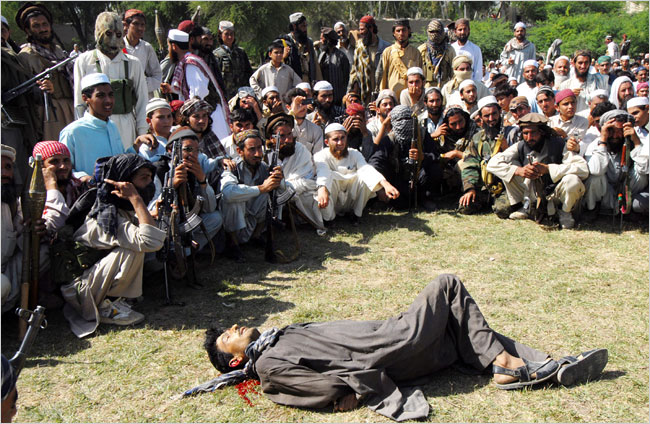
Tariq Mahmood/Agence France-Presse — Getty Images: Taliban sympathizers in the Pakistani border village of Rahim Kor at the execution on Sunday of a man accused of kidnapping. Pakistan’s government has little influence or formal presence in the tribal regions near Afghanistan, to the United States’ dismay. (Photo appeared in a New York Times article ‘Pakistan’s Planned Accord With Militants Alarms U.S.‘ on April 30, 2008)
The Times continued: “Mr. Obama said on the campaign trail last year that the possibility of breaking away some elements of the Taliban “should be explored,” an idea also considered by some military leaders. But now he has started a review of policy toward Afghanistan and Pakistan intended to find a new strategy, and he signaled that reconciliation could emerge as an important initiative, mirroring the strategy used by Gen. David H. Petraeus in Iraq.””
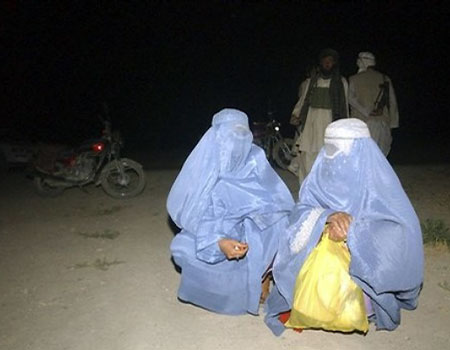
July 12 2008: Two unidentified Afghan Women chat with each other a few minutes before they were executed by Taliban in Ghazni province, Afghanistan.
The Times continued: “”If you talk to General Petraeus, I think he would argue that part of the success in Iraq involved reaching out to people that we would consider to be Islamic fundamentalists, but who were willing to work with us because they had been completely alienated by the tactics of Al Qaeda in Iraq,” Mr. Obama said. At the same time, he acknowledged that outreach may not yield the same success. “The situation in Afghanistan is, if anything, more complex,” he said. “You have a less governed region, a history of fierce independence among tribes. Those tribes are multiple and sometimes operate at cross purposes, and so figuring all that out is going to be much more of a challenge.””
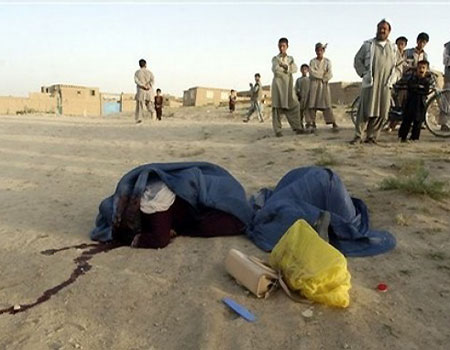
July 13 2008: Local people watch two Afghan women shot and killed by Taliban in Ghazni province, Afghanistan. Taliban fighters told Associated Press Television News that the two were executed for allegedly running a prostitution ring catering to U.S. soldiers and other foreign contractors at a U.S. base in Ghazni city.
The Times continued: “For American military planners, reaching out to some members of the Taliban is fraught with complexities. For one thing, officials would have to figure out which Taliban members might be within the reach of a reconciliation campaign, no easy task in a lawless country with feuding groups of insurgents.”
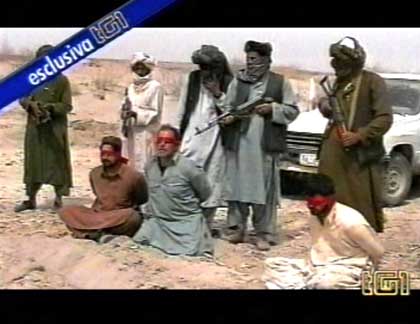
04/12/2007, AP / RAI TG1: The footage of the driver Agha’s execution was shown on Italian TV on Tuesday. … TG1 (Italy) broadcast the footage of the execution of Agha three and half weeks ago. The three men were captured in Helmand province on March 5. … Mastrogiacomo can be seen raising his head, as if he wants to look through his blindfold to see what is happening right next to him. A Taliban fighter raises a big knife and drags Agha to the ground. At that point TG1 stops the footage. The newsreader then says that after the execution the Taliban shook each others’ hands and clapped each other on the back. — Speigel Online (Germany)
The Times continued: “And [Obama] administration officials have criticized the Pakistani government for its own reconciliation deal with local Taliban leaders in the Swat Valley, where Islamic law [sharia law] has been imposed and radical figures hold sway. Pakistani officials have sought to reassure administration officials that their deal was not a surrender to the Taliban, but rather an attempt to drive a wedge between hard-core Taliban leaders and local Islamists.”
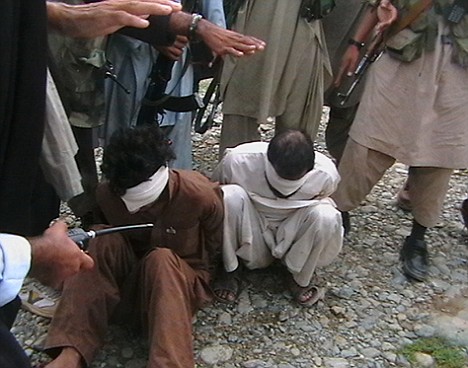
In a shocking display of hardline violence, Taliban militants in northwest Pakistan publicly slit the throats of two Afghans today after they were accused of spying for US forces suspected of launching a missile strike in May. — UK’s Daily Mail, June 27, 2008
In a separate New York Times report Sunday, this one exclusively written by Helen Cooper, reading all the way to the end you find some with a grasp on reality:
Last week, an editorial in the moderate daily newspaper Dawn strongly criticized the deal [Pakistan negotiating a truce with the Taliban in Swat], linking an attack on the Sri Lankan cricket team in Lahore to the need for the nation’s two quarreling political parties to unite in a crackdown on militants, rather than negotiate with them. In effect, it said, the divided Pakistani government was being conquered, not the Taliban. “If the state resorts to negotiating with militants from a position of weakness, what we will get is disaster, across the board,” the editorial said. “The politicians need to wake up, bury the hatchet in the national good and rout the real enemy.”
Daniel Markey, a former South Asia expert at the State Department under President Bush, said that lessons learned in Iraq — where the Bush administration enlisted Sunni militias as allies by negotiating with tribal leaders — don’t necessarily apply in Afghanistan. “The tribal structure in Afghanistan is different than in Iraq,” he said. “There’s no clear hierarchy. If you make a deal with one guy, you have a deal with one guy, and not his whole clan.”
Mr. Markey, now a senior fellow at the Council on Foreign Relations, said the approach had to be carefully calibrated. “You fight, you talk, you fight, you talk,” he said. “If by talking, you can divide your enemies, talk. But if by talking, you’re just giving your enemies breathing space, then don’t talk.”
Worth repeating is Dawn’s editorial that ended this way:
“The politicians need to wake up, bury the hatchet in the national good and rout the real enemy.”
The real enemy in both Afghanistan and Pakistan is the Taliban; without them, al Qaeda and all the other terrorist organizations there would have one less place to hide.
And if Afghanistan was the right war last year as Presidential candidate Barack Obama repeatedly asserted, then it is the right war this year for President Obama and America to fight for however long it takes to achieve victory.


4 comments for “Obama considering talks with some Taliban?”